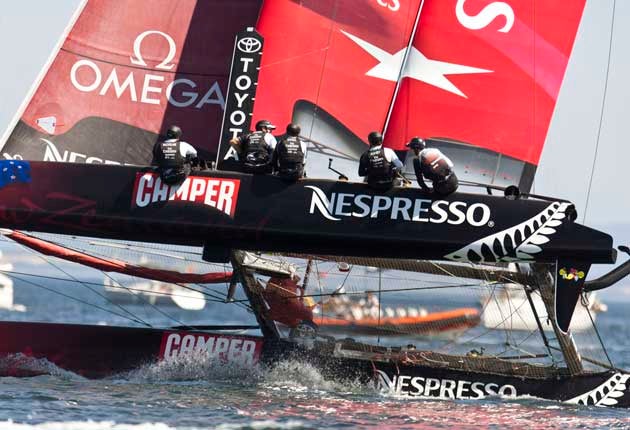Emirates Team New Zealand wins first America's Cup fleet trophy

Your support helps us to tell the story
From reproductive rights to climate change to Big Tech, The Independent is on the ground when the story is developing. Whether it's investigating the financials of Elon Musk's pro-Trump PAC or producing our latest documentary, 'The A Word', which shines a light on the American women fighting for reproductive rights, we know how important it is to parse out the facts from the messaging.
At such a critical moment in US history, we need reporters on the ground. Your donation allows us to keep sending journalists to speak to both sides of the story.
The Independent is trusted by Americans across the entire political spectrum. And unlike many other quality news outlets, we choose not to lock Americans out of our reporting and analysis with paywalls. We believe quality journalism should be available to everyone, paid for by those who can afford it.
Your support makes all the difference.Revenge was sweet for Dean Barker and his Emirates Team New Zealand as they grabbed the first fleet trophy of the America’s Cup World Series off Lisbon in a winner-takes-all single race.
The man who wants nothing more than to beat him, America’s Terry Hutchinson, skipper of Sweden’s Artemis, was second and the man behind all of this, cup holder and Oracle boss Larry Ellison, rode as an observer with his Australian skipper Jimmy Spithill to be third.
On Saturday, the match race title had gone to Spithill, who beat a Dean Barker hampered by some sail furling gear glitches that will need to be examined and modified before the next outing in Plymouth.
No glitch, though, on the last of the eight days as he played the flukey winds close to the shore.
There has been a switch in mood from unveiling a wonder show to acknowledgement that the format of what should be seven regattas in the first series is a work in progress.
“We set out to deliver a lot, particularly in a short period of time, and I think we have delivered most of it,” says Iain Murray, chief executive of America’s Cup Race Management. “For sure we will have a few wrinkles and we’re making improvements day by day but, are you going to see wholesale changes – I don’t think so.”
The failure to re-impose a nationality rule for the challenging teams has been given the fig-leaf cover of sticking national flags on the graphics which accompany the extensive and hugely expensive live television coverage.
Even on a more tightly controlled race area, the lottery factor may even have increased. An America’s Cup label on a regatta which counts nothing towards an America’s Cup has, however, been given more relevance by having cumulative points to produce a 2011-12 champion. But dribbling out the venues and dates of the fourth, fifth and sixth regattas is making life very difficult for everyone. The finale will be in Newport Rhode Island at the end of June next year.
Doubtless the current economic climate is also making life difficult for the commercial boys, but the lack of certainty is extra hard for teams which are looking for enough finance even to complete the 2011-12 season.
Market sentiment and rumour have their own effects in the sailing team survival game, and there is still talk about a couple of teams not being able to complete even the current series, never mind investing in the design and build of the 72-foot wing-powered catamaran still designated for the Louis Vuitton Cup challenger series in 2013.
On the other hand, there is also talk of two more teams joining the circuit, but talk is cheap, as Cup veteran Dennis Conner loved to say. Right now, the road to Damascus looks likely to have a few bumps.
Latest forecasts show big winds in the Celtic Sea 48 hours into the Rolex Fastnet Race, but well below the storms which led to 15 deaths in 1979. A final line-up of a record 318 boats set off from Cowes on Sunday – two were dismasted early in the fresh westerly - heading for the Fastnet lighthouse and rock off the tip of south-west Ireland. The 608-mile course takes them back to the finish in Plymouth.
Fastest should be the 140-foot trimaran Banque Populaire, skippered by Loick Peyron, aided and abetted by British solo and multihull sailor, Brian Thompson. Peyron flew to the UK after the finish of racing on Saturday on his AC45 Team Energy in Cascais.
Aiming to keep and even improve on his record of 44 hours and 18 minutes is Britain’s Mike Slade in his 100-foot Leopard. Aiming to break it and take it away is the American George David in his 100-foot Rambler.
But the top prize is often won by a less spectacular boat once handicap adjustments are made to the time taken, the defending champion being Niklas Zennström’s 72-foot Rán.
In Dun Laoghaire, the 46 competitors in the Figaro solo race set out on the third leg to Les Sables d’Olonne. At 475 miles, it is the longest of the four legs, with the race due to finish early next week in Dieppe.
The early part of the leg is predicted to be made easier by the westerly winds, but the final part from the tip of Brittany could be more complicated.
Join our commenting forum
Join thought-provoking conversations, follow other Independent readers and see their replies
Comments